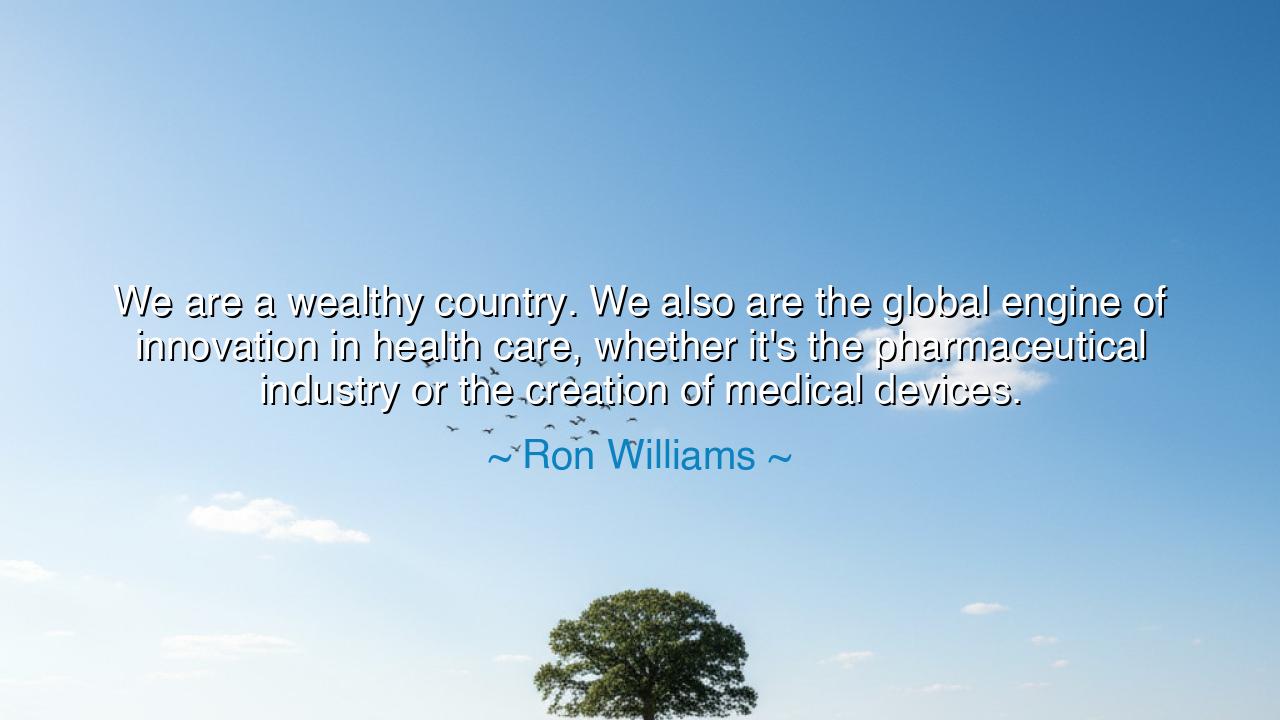
We are a wealthy country. We also are the global engine of
We are a wealthy country. We also are the global engine of innovation in health care, whether it's the pharmaceutical industry or the creation of medical devices.






The words of Ron Williams echo like a proclamation of both pride and purpose: “We are a wealthy country. We also are the global engine of innovation in health care, whether it's the pharmaceutical industry or the creation of medical devices.” These are not mere observations—they are a reminder of responsibility. For wealth, when joined with ingenuity, becomes a sacred trust; and innovation, when guided by compassion, becomes the heartbeat of civilization. In his statement lies both triumph and challenge: the recognition that material power and technological brilliance are gifts that must serve not vanity, but humanity.
From the earliest days, nations have measured their greatness not by their treasures, but by their contributions to the welfare of mankind. In the ancient world, empires rose and fell, yet only those that advanced the health and well-being of their people endured in memory. Egypt gave the world its first surgeons, India its first hospitals, Greece its first physicians bound by the Hippocratic Oath. So too, in our modern age, America stands as a wealthy nation, endowed with knowledge, industry, and abundance. But as Williams reminds us, its true wealth is not the gold in its vaults, but the brilliance of its minds—the doctors, scientists, and innovators who have become the engine of medical progress for all humankind.
The pharmaceutical industry, for all its imperfections, has wrought miracles once thought divine. Vaccines that banish pestilence, medicines that extend life, therapies that turn suffering into hope—all are fruits of human intellect guided by purpose. The medical devices of our time—machines that breathe for the weak, hearts that beat with steel and circuitry, instruments that reveal the unseen workings of the body—stand as monuments to the creative spirit. Williams’ quote is a tribute to these achievements, but it also carries a deeper echo: that such power must not become self-serving. The wealth and innovation of a nation must flow outward like rivers from a high mountain, giving life to those below, not merely adorning the peak.
History offers a lesson through the story of Dr. Jonas Salk, who developed the polio vaccine in the 1950s. When asked who owned the patent, Salk replied, “There is no patent. Could you patent the sun?” In that answer lies the soul of Ron Williams’ vision—that innovation in medicine is not merely a triumph of enterprise, but an offering to humanity. It is the moral obligation of a wealthy nation to ensure that its discoveries heal not just its own citizens, but the world entire. Without generosity, wealth becomes hollow; without compassion, innovation becomes vanity.
Yet even as we celebrate our progress, there is warning in these words. The engine of innovation, if driven only by profit, may run astray. A nation rich in means but poor in mercy forgets the purpose of its power. The ancients taught that abundance is a test of virtue: the more one has, the greater the duty to share. In the realm of health care, this means ensuring that the benefits of science reach the weak, the poor, and the forgotten. Williams’ quote thus calls not only for pride in achievement, but for balance—a harmony between prosperity and compassion, between discovery and justice.
To the youth and dreamers of tomorrow, his words carry a challenge: let your genius serve humanity. If you are an inventor, create not for glory but for healing. If you are a leader, wield wealth as a tool for good, not as a symbol of power. If you are a citizen of a wealthy country, let your gratitude be expressed through service—through advocacy, kindness, and awareness of those left behind. For the measure of a nation is not how many innovations it possesses, but how deeply those innovations touch the lives of its people.
And so, O listener, remember this wisdom: wealth and innovation are not ends in themselves—they are instruments of stewardship. To be the “global engine of health care innovation” is not a title of triumph, but a calling of conscience. Let those who possess knowledge use it with humility, and those who hold power wield it with compassion. For when science serves love, and wealth serves mercy, humanity ascends to its highest form.
Thus, Ron Williams’ words resound through the ages as both celebration and summons: celebrate the ingenuity that defines our era, but never forget the hands it must serve. In the balance of wealth and wisdom lies the destiny of nations, and in the harmony of healing and humility lies the true greatness of humankind.






AAdministratorAdministrator
Welcome, honored guests. Please leave a comment, we will respond soon